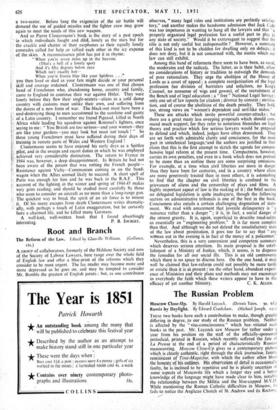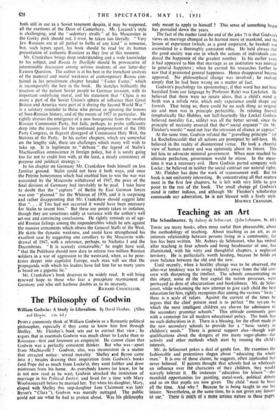The Russian Problem
THESE two books have each a contribution to make, though greatly differing in degree, to our study of the Russian problem. Neither is affected by the "visa-consciousness" which has- vitiated such books in the past. Mr. Laycock saw Moscow for rather under a year from his position on the staff of the officially-sponsored periodical, printed in Russian, which recently suffered the fate of La Prensa at the end of a period of characteristically Russian manoeuvring. Moscow Close-Up gives us a contemporary picture which is clearly authentic, right through the slick journalese, faintly reminiscent of Time-Magazine. with which the author often blurs the honesty of his outlines. His observation of detail is occasionally faulty, he is inclined to be repetitive and he is plainly uncertain of some aspects of Muscovite life which a longer stay and a better knowledge of the language might have made clear to him, notably the relationship between the Militia and the blue-capped M.V.D. While mentioning the Roman Catholic difficulties in Moscow, he fails to notice the Anglican Church of St. Andrew and its Rectory.
both still in use as a Soviet tenement despite, it may be supposed, all the exertions of the Dean of Canterbury. Mr. Laycock's style is challenging, and the "sedentary strolls" of his Muscovites in the Gorky park should not, I trust, be taken too literally. "Very few Russians are at all partial to baths of any kind •• is nonsense, but, such lapses apart, his book should be read for its human presentation of authentic Russians as they live at this moment.
Mr. Crankshaw brings deep understanding and a wide knowledge to his subject, and Russia by Daylight should be provocative of interminable discussion among serious students of our latter-day Eastern Question. The author is at his best in the trenchant analysis of the material and moral weakness of contemporary Russia con- tained in his penultimate chapter headed "Faster Faster," which is incomparably the best in the book. He sketches brilliantly the ' reaction of the patient Soviet people to German invasion, with its important underlying moral, and his statement that " Chjna is no more a part of the Soviet Union's sphere of influence than Great Britain and America were part of it during the Second World War" is a salutary reminder to those who persist in ignoring the lessons of Sino-Russian history, and of the events of 1927 in particular. He rightly stresses the emergence of a new bourgeoisie from the swollen Russian Communist Party, but fails, perhaps, to probe sufficiently deep into the reasons for the continued postponement of the 19th Party Congress, in flagrant disregard of Communist Holy Writ, the Statutes of the Party. In his earlier chapters, which are somewhat on the lengthy side, there are challenges which many will wish to take up. It is legitimate to " debunk " the legend of Stalin's Machiavellian omniscience in foreign policy, but it is surely going too far not to credit him with, at the least, a steady consistency of purpose and political strategy.".
In his chapter on Germany Mr. Crankshaw finds himself on less familiar ground. Stalin could not have it both ways, and once the Petrine honeymoon which had enabled him to win the war was succeeded by the Muscovite withdrawal of 1947, the price of the final division of Germany had inevitably to be paid. 1 take leave to doubt that the " capture " of Berlin by East German forces was ever " planned " for the Whitsun of 1950, and it is surprising and rather disappointing that Mr. Crankshaw should suggest later that ". . . if Tito had not occurred it would have been necessary for Stalin to invent him." But these are points taken in isolation, though they are sometimes oddly at variance with the author's well set-out and convincing conclusions. He rightly reminds us of age- old Russian failings among the imponderables which he sets against the massive armaments which obsess the General Staffs of the West. He skirts the dynastic weakness, and could have strengthened his excellent case by suggesting one corollary to the Muscovite with- drawal of 1947, with a reference, perhaps, to Nicholas I and the Decembrists. "It is scarcely conceivable," he might have said, "that the Politburo should now dare to release two million Russian -soldiers in a war of aggression to the westward, when, as he pene- trates deeper into capitalist Europe, each man will see that the propaganda with which his leaders have fed him for so many years is based on a gigantic lie."
Mr. Crankshaw's book deserves to be widely read. It will bring renewed hope to those who fear a precipitate rearmament of Germany and who still harbour doubts as to its necessity. RICHARD CHANCELLOR.



































 Previous page
Previous page